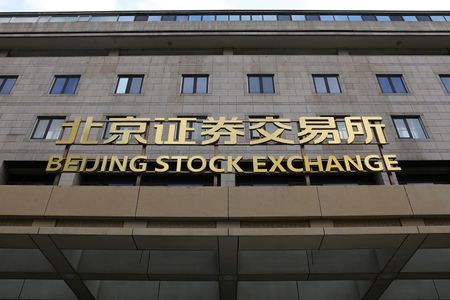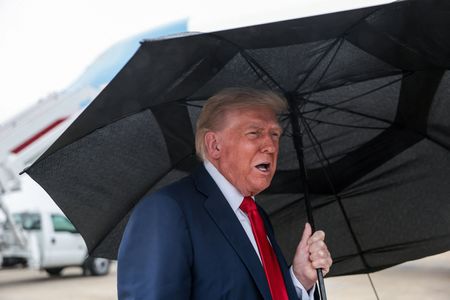HONG KONG/SHANGHAI (Reuters) -China stocks fell sharply on Monday as a renewed trade war between Washington and Beijing hit risk appetite and spurred profit-taking in a share market hovering near its highest level in a decade.
The blue-chip CSI300 Index and the Shanghai Composite Index fell nearly 2% in early trading. Hong Kong’s Hang Seng benchmark was down more than 2%.
Defying the broader selloff, China’s strategic sectors including rare earths and semiconductors were up in early trade.
However, investors and analysts believe the sell-off will be less severe than the panic-selling seen in April, when U.S. President Donald Trump kicked off a global tariff war. Bond prices are expected to rise on Monday.
Trump on Friday unveiled additional levies of 100% on China’s U.S.-bound exports, along with new export controls on critical software by November 1, in a reprisal against China curbing its critical rare earth exports.
The threats, made after Asian markets closed, sent U.S. and European markets sharply lower. An index tracking Nasdaq-listed China stocks tumbled 6%, while the U.S.-listed KraneShares CSI China Internet ETF plunged 7%.
TRADE WAR WORRIES RETURN
“In the short term, the revived trade war will weigh on China’s stock market,” said Wang Yapei, a Shanghai-based hedge fund manager.
But he expects the turbulence to be short-lived, betting China and the U.S. will eventually work through negotiations, as “the cost of large-scale conflict is too high for both powers.”
Investors also expect policy support from Beijing to help soothe investor nerves while betting that Trump may back down slightly.
China described Trump’s latest tariffs on Chinese goods as hypocritical on Sunday and defended its curbs on exports of rare earth elements and equipment, but stopped short of imposing new levies on U.S. products.
Trump appeared to seek to ease tensions in a social media post overnight, saying “The U.S. wants to help China.”
Charles Wang, chairman of Shenzhen Dragon Pacific Capital Management Co, said growing geopolitical uncertainty means China will likely further ease monetary policy to aid economic growth, boding well for stocks.
A correction could also create buying opportunities in Chinese tech stocks, which would benefit from Beijing’s stepped-up self-sufficiency drive amid growing threats of “a Sino-U.S. tech decoupling,” he said.
In addition, investors are inspired by signs that China is proactively restricting rare earth exports before the U.S. has time to build its own supply chains, he said. Not using this leverage now is “like saving your trump card for too long and missing your chance to use it.”
TACO AGAIN?
China Merchants Securities said geopolitical tensions benefit Chinese sectors including artificial intelligence, robots, defence, innovative drugs and chipmaking.
“Any correction would give long-term investors a chance to buy the stocks at lower prices,” the brokerage said.
But Trump’s proposed 100% tariff hike will torpedo export-oriented sectors including electric motors, electrical equipment, nuclear reactors, boilers, machinery, furniture and bedding, according to Xiangcai Securities.
If the increase materialises, “it will wipe out profit at most Chinese exporters,” the brokerage said in a note.
Many analysts, however, think the chance of triple-digit tariff is slim.
“This statement is more of Trump’s signature negotiation tactic—applying maximum pressure to bolster bargaining leverage and force concessions during trade talks,” Changjiang Securities said in a report. “It will likely again play out as TACO (Trump Always Chickens Out).”
Lu Ting, Nomura’s Chief China Economist, said continued economic and trade clashes between the two superpowers are inevitable.
“However, in the near term, both sides are still reliant on one another…so we believe this latest escalation is more about posturing for incoming negotiations and meetings,” he said, seeing “a decent chance” of a Xi-Trump in-person meeting during the APEC annual summit in South Korea later this month.
(Reporting by Summer Zhen in Hong Kong and Samuel Shen in Shanghhai; Editing by Sam Holmes)











